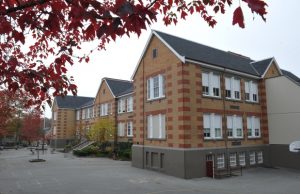During initial lectures we were explained the two options for our participation in Sociology 100. We could attend a normal discussion class with weekly meetings to discuss the course. Or we could participate in the Trek program and visit a chosen placement weekly, serving as a volunteer to the community. Coming to University I was eager to not only learn within but also outside of the campus. I saw Trek as an opportunity that would ensure learning outside campus, but also allow me to engage in the community. I had been looking into several clubs on campus to join a community, however, I wanted to interact and engage with people outside of the University boundaries.
I was not assigned a placement until January and so I do not believe that my participation in Trek significantly helped my integration into University or navigation of the institution since I had already been in Vancouver since August.

VANCOUVER, BC.: OCTOBER 10, 2012 -Florence Nightingale Elementary school is celebrating it’s 100th anniversary in Vancouver, B.C., October 10, 2012.
(Arlen Redekop photo/ PNG)
(For story by [Gerry Bellett])
Additionally, in discussion classes, it was interesting to expand on how volunteering is a way that society develops a community. There were many times where I had not thought that I made any impact in the classroom or on the students, but Dr. Greer addressed how our presence and small conversations with the children give them a different outlet. For example, many students may not think University is an option for them due to many reasons, but speaking and forming a relationship with a university student would influence their thoughts towards university.
Personally, I am a student that learns most with hands-on experience and applying/directly seeing what is taught in lectures. My placement in Florence Nightingale Elementary facilitated understanding in lectures regarding institutions of community and child development, and helped me learn about the societal institutions and their functions in a city that differed from one I grew up in.